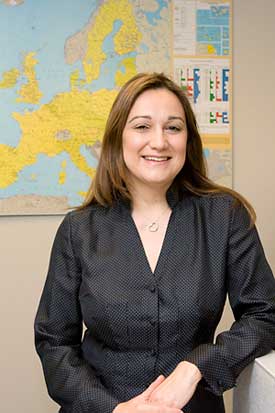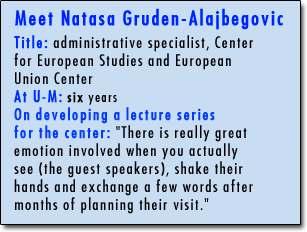The Yugoslavia that Natasa Gruden-Alajbegovic and her husband emigrated from in 1990 has splintered, leaving the couple with no single country to go home to.

Gruden-Alajbegovic, from Serbia, and her husband Ales, from Slovenia, moved to the United States in 1990. They expected to stay until he finished a doctoral degree at Rensselaer Polytechnic Institute (RPI) in Troy, N.Y., but political events in their homeland changed those plans.
“After Yugoslavia disintegrated, we belonged to two different countries that didn’t have diplomatic relations and that didn’t recognize each other,” she says. “Part of our lives were done and over with and we had to start new ones with the realization that we’d never go back home.”
This led to their decision to stay in the U.S., and eventually to move to Ann Arbor in 1997. After visiting as a student, Gruden-Alajbegovic says she knew what to expect from the United States but she was still impressed by the “American educational system and the friendliness and politeness of the people.”
Today she is excited about working with the Center for Russian and East European Studies (CREES). “From our perspective, joining with CREES put us in a better position to address issues of enlargement. We are building on that strength because one of the main topics the EU (European Union) wants to promote in the U.S. is knowledge of the Union and its enlargement.”
Gruden-Alajbegovic earned a bachelor’s degree in international relations from Webster University of St. Louis in Vienna and a master’s degree in international relations from the University of Belgrade. She joined U-M in 2002 as an administrative assistant at the Center for European Studies and advanced to administrative specialist in 2005. She manages the grant that the center receives from the European Commission. Its purpose is to disseminate knowledge at U-M about the European Union. The grant funds faculty research projects, student fellowships and programs, and outreach programs at Ann Arbor public schools.

Besides managing programs for the center, she also helps organize the series of lectures that the center brings to campus.
Her favorite lectures include those of former Daimler-Chrysler chairman Dieter Zetsche, and the visits of former Polish President Aleksander Kwasniewski and former German foreign minister Joschka Fischer.
“There is really great emotion involved when you actually see these people, shake their hands and exchange a few words after months of planning their visit,” she says. “Dr. Zetsche came in 2004 and it’s interesting to look back on that event now that Chrysler has been sold. I feel like I was somehow a witness to history.”
The year 2004 also marked the largest period of EU enlargement in its 51 years of existence, as 10 countries from Central, Eastern and Southern Europe joined. Gruden-Alajbegovic calls it “the best foreign policy move that the EU could make, opening up to countries that worked very hard to achieve this. All of them enjoy prosperity and stability and are part of a bigger group that can actually have influence on the world stage.”
Gruden-Alajbegovic balances her work schedule with raising her three elementary, middle school and high school aged children.
Because Gruden-Alajbegovic’s extended family lives in Austria, she returns there now when she visits Europe. Her daughters visited Slovenia last year. “They appreciate where we come from,” she says. “They love the food, culture and music of places we visit in Europe.
“I love my job because I learn a lot, review a lot, read and even get my kids excited. It’s a very exciting time to be involved in European studies,” she says.
The weekly Spotlight features staff members at the University. To nominate a candidate, please contact the Record staff at [email protected].

